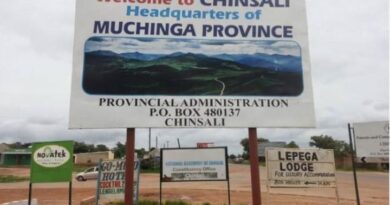Lighthouse Foundation Calls for Urgent Climate Action as Zambia Faces Devastating Impacts
Climate change has cast a long shadow over humanity, posing the greatest threat to all living things on Earth. It has become the world’s most pressing humanitarian crisis, disproportionately affecting various countries and social groups. Women, children, refugees, and people with disabilities are especially vulnerable.
Emily Nalwamba, founder of the Lighthouse Foundation, highlights that Africa, despite vast economic potential and natural resources, is home to over 70% of the world’s least developed countries (LDCs). The continent contributes minimally to global greenhouse gas emissions, yet bears the brunt of climate change’s consequences.
Zambia, like many African nations, is no stranger to these devastating impacts. The country’s climate is highly variable, experiencing a rise in climate-driven events like seasonal floods, flash floods, extreme temperatures, dry spells, and droughts. These events have become more frequent, intense, and destructive, straining Zambia’s ability to care for its citizens and hindering economic progress.
In February 2024, President Hichilema declared a national disaster due to the prolonged drought. The El Niño weather phenomenon, exacerbated by climate change, severely impacted critical sectors like agriculture, water availability, and energy supply.
Ms. Nalwamba emphasizes the risk to national food security and the livelihoods of millions, as maize crops, a dietary staple, have been significantly destroyed.
The drought’s impact extends beyond agriculture. The energy sector faces a looming deficit, potentially exceeding 520 megawatts by December 2024. This disruption in electricity production and availability has forced many communities to turn to charcoal as an alternative energy source.
However, Ms. Nalwamba warns that this practice worsens deforestation, a major contributor to climate change itself. The recent seizure of six trucks laden with charcoal and two carrying timber by the forestry department underscores the national fight against charcoal use.
The drought has compounded existing challenges like the COVID-19 pandemic and cholera outbreaks. School closures in heavily affected areas have further disadvantaged the education sector. Additionally, resource allocation has shifted to address the drought, diverting funds from planned social and economic development initiatives.
Water scarcity, impacting both ground and surface water resources, threatens not only human health but also wildlife habitats, raising concerns about potential human-animal conflict and disease outbreaks.
Despite these challenges, there are flickers of hope. The Zambian government and NGOs are actively involved in solutions. The government’s approach combines short-term and long-term measures, including directing resources towards humanitarian relief, importing additional electricity while promoting alternative energy sources, sourcing extra food supplies, and enhancing water harvesting and irrigation techniques. They are also expanding agricultural support programs and accelerating the development of renewable energy sources like solar and wind power.
Climate and nature conservation NGOs like Care for Nature Zambia and the Lighthouse Foundation are actively involved in restoring and conserving ecosystems ravaged by the drought. They work hand-in-hand with local communities on various projects promoting environmental and economic sustainability for better livelihoods.
Youth-led organizations are also playing a crucial role, collaborating on climate education projects to raise awareness and empower future generations to become environmental stewards.
Zambia’s efforts are further bolstered by international support. The country is set to receive $13 million from the Africa Risk Capacity for disaster management.
With the future hanging in the balance, Ms. Nalwamba emphasizes the urgent need for global cooperation and collective action to address climate change and create a sustainable environment. “Finger-pointing is no longer an option,” she urges. “The time for new beginnings and innovative solutions is now. We all have a role to play in building a more sustainable future for all.”
Her message is a powerful call to action, urging the world to unite in the fight against climate change and support Zambia as it grapples with its devastating consequences.



